Alina Bronsky, Frankfurt (D)
Alina Bronsky was born in Jekaterinburg (Russia) in 1978 and lives in Frankfurt. Bronsky was suggested as Ijoma Alexander Mangold competition sponsor.
Download text in:
Word file format (*.doc)
PDF file format (*.pdf)
Information on the author
Videoportrait
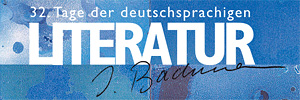
Alina Bronsky
from the novel The Broken-Glass Park
Sometimes I think I'm the only one in our part of town that still has sensible dreams. I have two and neither of them are embarrassing. I want to kill Vadim. And I want to write a book about my mother. I already have a title: ‘The Story of a Brain-Dead Redhead, who would still be alive if she had listened to her eldest daughter'. Maybe that is just a subtitle. I have time to think carefully about it, because I haven't started to write.
Most people who live in our part of town don't have any dreams. I even asked around about it. And the dreams of those few people who do have them are so pitiful that, if I were them, I would rather have none.
Anna's dream, for example, is to marry someone rich. He should be a judge and in his mid-thirties and, if possible, not too ugly.
Anna is seventeen, like me, and she says that she would marry someone like that straight away, if he came along. Then she could finally leave our block, Solitaire, and move into the judge's penthouse. No one apart from me knows that Anna sometimes takes the tram into the city centre and walks round the court thirteen times, in the hope that the judge will finally come out, discover her, give her a red rose, inviting her first for an ice-cream and then to his penthouse flat. She says, you have to work for your good fortune, otherwise it will pass you by.
‘Do you know what "solitaire" actually means, you stupid cow,' I ask. ‘It's a particularly high-quality diamond that has been set by itself in a crown. If you move out of here you won't ever again get a place in a block of flats standing all on its own like this one.'
‘You made that up. No way would they have named this hulk of concrete after a diamond,' said Anna. ‘And anyway, people who know too much, get old and wrinkly quickly.' That's a Russian saying.
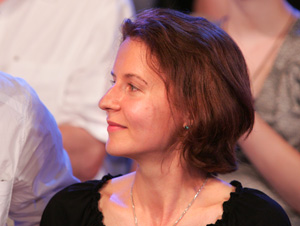
As Anna's judge was taking his time appearing, she was sleeping with Valentin for now, who also had a class C dream. He wanted a brand new, snow-white Mercedes. First he needs to get his driving license, so he delivers advertising bumf before school. Doing it, he normally has a look on his face as if someone had shoved a cactus down his trousers.
While Peter on the fifth floor dreams of a real blonde with dark eyes. He used to go out with Anna, she has brown eyes, but she's not real - not as a blonde. He was never interested in me. My hair is too dark.
I'm Sascha Naimann. I'm not a boy, even though everyone here thinks that when they hear my name. Sascha is short for Alexander AND Alexandra. I'm Alexandra. I'm called Sascha, my mother always called me that and that's what I want to be called. If someone says Alexandra to me, I don't react.
Sometimes I think that I will never meet new people again, because I'm tired of having to explain to everyone the same old story. Why I'm called Sascha. How long I've been living in Germany. How I managed to lose my Moscow accent for standard German so quickly, a German in which I bitterly fight to eradicate the Hessian sibilants that I picked up from the Turks from a neighbouring block when I moved to Germany.
I taught myself everything, I could reply. If I wanted to reply. After all, my head is full of grey matter that looks like a walnut and macroscopically seen has many windy turns, microscopically, on the other hand, a handsome number of synapses. I probably have a few million more synapses than Anna, for sure. If I only get a 2, the teacher comes over to me and apologises.
My mother laughed about that and said I was too weird for her. I was always weird for her, because I could think more logically than her. Not that she was stupid, just far too emotional. She read at least one fat book every week, played piano and guitar, and knew a million songs.
But adding up one plus one, she couldn't do that. Or know when it's time to turf out a man. Those seem to be skills that I have from my father. The only things I know about him are that he had several doctorates and a lousy character. ‘The lousy character you've already got,' my mother said. ‘And the doctorates will no doubt follow.'
I'm the only one from our area who goes to the Alfred Delp School. It is a private Catholic school, and to this day I don't know why they took me, back then - by and large without the language, not baptised, in a gaudy pink woollen pullover that my colour-blind grandmother had knitted. That was long before everyone was wearing pink pullovers. And my mother holding my hand, my mother who back then only spoke in flowery English with a terrible accent, but very loudly to compensate, and who wore her flaming red hair loose. And in my other hand I held a litre carton of milk in an Aldi plastic bag.
Along with my mother, hundreds of Catholic German architects, doctors and lawyers had registered their children. All of them people on whose foreheads you could read in big letters ‘Like to give generous donations'.
I have learnt since that my acceptance was a project for the school: a little bit of integration and oodles of good PR. All those doctors, lawyers and architects were sent rejection letters. On my first day at school my fellow pupils stared at me, as if I had just clambered out of a UFO. As most of them hadn't ever seen a foreigner close up before, they were all nice to me.
My mother used to say I should invite my school friends round to ours. She only said that because she didn't have a clue. She was always inviting friends round. But I had already been to the homes of two girls from my class and couldn't with the best will in the world imagine it the other way round.
No idea what was the biggest shock for me: the tidiness of my classmate Michaela's room, the furniture - which until then I had only thought existed in catalogues and in Anna's fantasies -, or the bed linen printed with horses. I had never seen multi-coloured sheets before. At home we only had white or light blue patterned sheets, and of course ancient and faded. I wondered how you could sleep on and under these horses without seeing a flickering before your eyes.
My classmate Melanie had rosy cheeks, smelt of soap and wore an ironed denim jacket. Her mum looked pityingly at me out of the corner of her eyes over lunch and asked me about my hometown, the weather in Moscow, my old school and my mother.
I said that my mother had studied art history and in Moscow had performed with a theatre group that was always getting banned, and that she wanted to join a little theatre here too. Melanie's mother swallowed and moved on to the question of whether life in our tower block wasn't overly dangerous. I said that it was much cleaner and more cosy than the house that I had lived in over there. I always said ‘over there' for Russia.
Melanie chewed her profiteroles without a word.
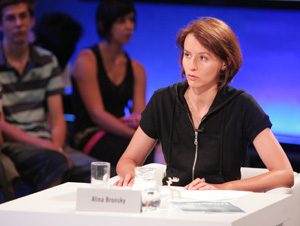
After the meal we went back to her orderly room. Melanie turned her hi-fi on. I discovered a pile of old teen mags and began to read them. Melanie was twisting back and forth on her office chair and phoning a friend. Considering that we had nothing to say to each other, I found it a good way to spend our time. In the evening Melanie's mother drove me home, looked around nervously and insisted on taking me to my door, to hand me over to my mother.
My mother, however, wasn't at home. I had a key.
‘Come again,' said Melanie's mother and patted my cheek.
‘All right,' I said and thought to myself: only if there are new mags.
Then I saw our flat with different eyes.
Our salvaged sofa, the little table in front of it whose third leg falls off if you so much as look at it. The little television and the pile of videotapes in front of that. Even back then nobody had more videotapes! The cupboard without a door. My stepfather's socks on the radiator. My brother's long johns on the chair. Our five chairs were salvaged from the dump, our crockery from the flea market.
Our kitchen table was littered with jam jars, letters, postcards, half-empty bottles and old newspapers. We didn't own a dishwasher then, and normally all our dishes piled up in the sink until my mother came home in the evening and tidied up. Sometimes I did them, but not that often. Mainly when Vadim told me to. Only when my mother's name issued from his dirty mouth did I hurry to do them.
I hate men.
Anna says that good men exist too. Nice, friendly men, who cook and clean up and earn money and want to have kids and give presents, and book a flight to the Canaries and wear clean clothes and don't booze and maybe even look good. Where are they, I ask at that point, on the moon? Anna claims that such men do exist, if not in our town then perhaps in Frankfurt. But she herself doesn't know any personally, apart from on television.
That is why I like to repeat what my mother always said: I'm my own man. She might have said that, but she never kept to it.
I feel much better now that I know I'm going to kill Vadim. I also promised it to my little brother Anton, who is nine. I think it has made him feel better. When I told him, his eyes opened wide and he asked breathlessly, ‘And how are you going to do that?'
I pretended I had it all under control. ‘There are thousands of possibilities,' I said. ‘I can poison him, strangle him, throttle him, stab him, throw him off the balcony, run him over with a car.'
‘You don't have a car,' my brother Anton replied, and of course he was right.
‘At the moment I can't get to him, anyway,' I said. ‘You know he's in prison. He'll be inside for many more years.'
‘So it won't happen for ages?' he asked.
‘Right,' I said. ‘But that's good. I have time to prepare. You know, it's not simple to kill someone, if you've never done it before.'
‘The next time will be easier,' said Anton, the expert.
‘For now I just want to manage this one time,' I said. ‘It's not meant to become a hobby.'
I was relieved that Anton approved. After all, Vadim is his father. But my little brother hated him as much as I did. If not more. He was already a nervous wreck beforehand, because unlike me he had always been afraid of Vadim.
Anton is still a mess now, and it's not getting better. I wonder whether all these therapies do any good. Anton stutters, he can't sit still in school, pisses his bed at night and starts to shake if someone raises their voice. And he claims that he can't remember anything. That is when I say, Be glad. I'm glad too that I can't remember anything, although I was there.
I can talk to Anton about my first dream. Not about the other one. Because whenever anyone says ‘mum' in his presence, he goes rigid and then you just can't get through to him. But other kids from our block find it exciting to regularly test if this is still how he reacts.
So I clobber any kid that intentionally says the word ‘mum' in Anton's presence. It's the least I can do for my brother. Apart from not sending him packing when he comes crying to my bed at night, pressing himself against me and then at some point, when the alarm clock rings, peeing on my legs in fright.
I used to want to be famous, like everyone does. I wouldn't have minded having a celebrity mother then, talked about by everybody. But when we all then really were famous, I could have throttled them - the photographers and cameramen, the men and women with mikes and little notebooks, who filmed the entrance to our block and rang our neighbours' doorbells to ask how loud it was that evening. Who screamed? and who cried?, who ran? and did Vadim really say, ‘There's blood here, don't go in there'? And also ‘It's over, piss off'?
The next day my mother was in all the papers. Her first name, the first letter of her surname, year of birth and a photo. It was the photo they had of her theatre group, a beautiful picture, her long red hair, her face not as made-up as usual, wearing a black pullover. She became a star then.
Look, are you happy now, I asked her. Didn't I warn you? Why did you marry that bastard? Why did you let him in that sodding evening? You were always such an unbelievably stupid woman, I said to her. How could you do that to me, have been so stupid?
Later I apologized to her. That was just how she was, she couldn't help it. They don't make them like her any more - a little more and a little better and a little finer in everything. And I will write that in my book, so everyone finds out. I don't want her only to be famous for having had such a wretched death.
And all those reports in the papers - I read them right from the start. I always ran down to the newsagent's and bought everything they had. The first few days we weren't at home, because social services put us up in a flat that belonged to the city. But after two days I said that we couldn't stand it any longer. The flat didn't have any dust or books or life. It had a rubber tree made of plastic. I said, the little ones want to go home. We were allowed to go home, where everything was oddly tidy, as it never had been before. We were cared for round the clock by a number of short-haired women who all looked the same and had double-barrelled surnames, and by a man with long hair who also had a double-barrelled surname.
I can barely remember those days. I only know that I talked almost the whole time, telling them how our life had been organized beforehand and that everything had to stay the same now. That they should on no account buy any other food apart from the food we were used to. But then one day organic butter was on the table and I had a crisis.
I still remember how one of the women looked at me as I sank screaming to the floor, right on the butter I'd stamped on. It was a look of relief. They had been drumming it into me for days, that I didn't need to function, not right now. I could give my feelings free rein. In fact I had to.
But I hadn't listened to them.
And then Maria was there. A second cousin, imported with her three bulging suitcases from Novosibirsk. A chance for the traumatized children to become a family again.
Vadim's cousin, by the way.
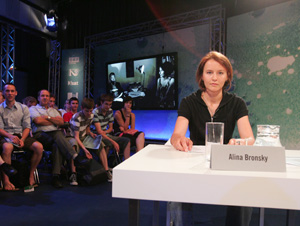
I had agreed for her to come, because after the incident with the city's flat,d I had an allergic reaction to any mention of a home, and there was no queue of foster carers waiting to take in three disturbed, Russian born brats. And certainly not to move into the flat whose door had been snapped as many times as Heidi Klum.
So then, Maria.
Maria is in her mid-thirties, looks about fifty. She worked in a factory canteen in Novosibirsk. Maria is callused hands as big as spades, her nails varnished blood red, short hair, dyed blonde and permed, thick varicose-veined legs, that you don't see under her wool tights, a dozen flowery dresses, a backside so wide you could land a helicopter on it, sickly sweet perfume that makes you sneeze, a big mouth painted red, chubby cheeks, little eyes.
Kind eyes. And that is how she is, kind.
Alissa succumbed to her immediately. Maria this, Maria that, Mascha, my, Ma-Ma-Ma-MAMMY! I wasn't annoyed with her for that. She was still so bloody tiny.
She occupied Maria's limitless lap straight away. I think she wanted to stay there for days, and Maria was really nervous, because she couldn't cook easily with Alissa on her lap. As if any of us were wanting to eat.
She cooked well, Maria did. She still does. Much better than my mother. Maria knows how to make borscht and other complicated soups. It always smells of food in our flat. She can cook clear soups, with chicken or beef, vegetables and bundles of herbs. She fries perfectly formed meatballs and pancakes as thin as lace. She discovered condensed milk in the Russian supermarket, a sweet mush that was more hotly sought after than caviar in the Soviet era, and she always dips the folded pancakes into it. She pickles gherkins and makes jam from blackcurrants.
In the newspaper articles Maria was the ‘only living relative who was ready to care for the three children left behind'.
We weren't ‘left', I muttered. And Maria didn't come to throw her valuable life down at our feet. If you work in a canteen in Novosibirsk and are suddenly asked if you would like to come to Germany to cook soup for a few kids, then it might not be half a kingdom, but it is a lot better than a lottery win.
Especially as Maria only married sometime when she was young and then soon got divorced. Maybe twice. Not having children or pets, she thought that she had nothing binding her to her tiny flat and her canteen. That has not proven to be the case, and I could have told her that straight away. Because in Novosibirsk she always found a willing ear to listen to her opinions, which she backed up with anecdotes from her messed-up life. Here, on the other hand, no one shows any interest in them. So she is normally damned to silence.
After almost two years here Maria has about twenty words of German, words like bus, potato, butter, rubbish, cook, wash, fuck off (for the wavy, black-haired youths who sometimes catcall her on the street and make troubling gestures). She sometimes puts this vocabulary together in sentences. That normally goes wrong.
If, for once, she is not shopping in the Russian supermarket, she has to point to things and write down the numbers. She always carries a notebook with her for that. She returns from every trip to Aldi bathed in sweat. If someone speaks to her on the street she whimpers and her face goes red and blotchy. I practiced the phrase ‘I only speak Russian' for two weeks with her. She carries that on a slip of paper in her purse, transcribed in Cyrillic letters. If the double-barrelled names from social services are visiting, Maria gets into a panic, every time, and for a long time before and afterwards I have to tell her that she is doing a good job and won't have to go back to her canteen pots.
Because, however absolutely miserable she might be in our Solitaire, there is no way she wants to go back to Novosibirsk, at least not yet. She does dream of going back some time, later, slimmer, elegantly made up, with a suitcase full of chic clothes and, ideally, arm-in-arm with a German with a neat moustache. He has to be nice and rich and, above all, speak Russian, because this German language, says Maria, is worse than Chinese, which I'm learning now on Tuesday afternoons in a school club.
When I'm doing my homework, sometimes she stands behind me and sighs, ‘Learning is important, learning is good. I never learnt anything, was always working. Even as a child. And now look at me. Did all that grind help me?'
‘Read something, sweetie,' I say. ‘It doesn't have to be War and Peace. Try a detective story.'
‘I'm always so tired in the evening, my little sun,' she says. ‘When I've read a bit I immediately forgot what it was, and have to start again. It's too much for me.'
So she reads one of the tear-off pages of The Orthodox Housewife's Calendar every day, sometimes a recipe, sometimes a tip for losing weight more quickly, and occasionally a joke, that is enough for her. Then I roll my eyes, but so that she doesn't see. Because it is really not her fault that she wasn't given enough synapses at the start, and then lost two thirds of them in her canteen.
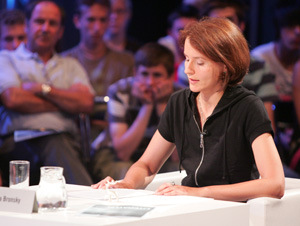
I just worry about Alissa sometimes. For now Maria is still on a slightly higher intellectual level than my sister, who has just turned four, but that will change soon. I have introduced set times for Maria to read aloud to Alissa. ‘I never knew,' said Maria in amazement after the first picture book, ‘that there are such interesting books.'
She loves Alissa dearly. So dearly, that she was against the idea of sending the little one to a nursery when she turned three, where you find childhood illnesses and frozen food, and I had to threaten with social services to break down her resistance. Maria is always kissing and cuddling my sister and it has taken many stifled tears for her to keep from saying the pitiful ‘my poor little orphan', which I have strictly banned.
If Maria did have to go back to Novosibirsk, it would break not only her heart but also my sister's. ‘When Alissa has grown up, then I'll feel free again,' says Maria. ‘I want to bring her up so that she is happy and healthy (my-poor-little-orphan).'
On other days Maria says that she will only feel free when Alissa has found a decent man to marry.
‘You're not a serf,' I say. ‘And maybe Alissa will only find a decent man in her late thirties. If she's lucky.'
Maria sighs. ‘When Alissa has a degree,' she says in the end, ‘I'll be pretty happy too.'
‘Degree' is a magical word for her, as are capital gains tax and paracetamol.
She would die for Alissa. That doesn't mean that she holds anything against Anton. She keeps trying to caress this little orphan too, but Anton doesn't let himself be touched. He just keeps taking another step backwards, until he has his back to the wall. Then Maria, too, understands that she should keep her hands off him.
Maria is afraid of me, and that has its advantages.
Maria sees many reasons to admire me. I have mastered this accursed country's language. I explain our world here to her and accompany her on shopping trips when an interpreter is needed. I know how to apply for benefits and for child allowance. Normally I'm there when social services call. When I have to translate a question for her, I'm normally already thinking up the answer.
Maria gets into a real panic at anything to do with officials. She feels as small as an ant in the presence of anyone who exudes state authority. She even talks extra politely to the ticket machines, and when an inspector does get on a bus, she whips her ticket from her handbag with a subservient smile so quickly that her lipstick and her tampons shoot out like bullets.
‘Take it easy, Maria,' I hiss, if I happen to be with her, and crawl around on the floor collecting her implements, while a paralysed Maria stands there beaming at the inspector's back.
‘I wouldn't have thought he'd be one,' she whispers respectfully. ‘With his long hair and an earring like a Beatles. The things they allow here. What's that hanging from his ear?'
‘An mp3 player,' I explain.
‘What?'
‘Music.'
‘I think you'll turn out like your mum, one day,' Maria said in one of these moments.
‘What?!'
She claps her hands over her mouth.
‘What did you say?!'
‘Nothing, nothing,' she whispers. ‘Nothing, nothing.'
Then we get out in the centre of town and exchange the wristwatch that Maria bought two days ago for four euros ninety-five, and that hasn't worked since yesterday.
Translated by Stefan Tobler

